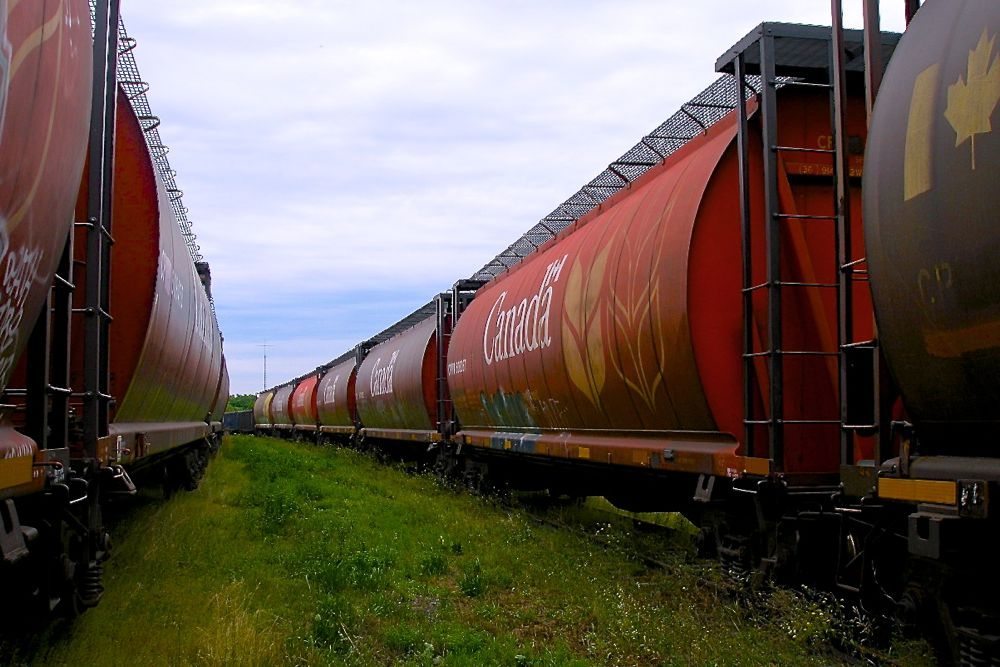Ottawa moves to extend expanded rail interswitching
CN, CP disappointed with planned one-year renewal for C-30's provisions
By Dave Bedard
| 5 min read

(Dave Bedard photo)
Prairie crop growers hoping that changes in federal rail freight rules will continue past their expiration date are about to get their wish.
Transport Minister Marc Garneau and Agriculture Minister Lawrence MacAulay on Friday announced they would bring forward a resolution in Parliament to extend provisions of the previous government’s Bill C-30, the Fair Rail for Grain Farmers Act.
The provisions — which included an expansion of the limits on rail interswitching for the Prairies, tougher rules on level-of-service complaints, and, if need be, mandatory minimum grain tonnage — are set for repeal Aug. 1 as part of a sunset clause in C-30.
Postponing that automatic repeal will require both the House of Commons and the Senate to adopt a resolution to that effect.
Spokesmen for both Canadian Pacific and Canadian National Railway (CP, CN) said the companies are “disappointed” with the government’s plans to renew those clauses of C-30.
The affected provisions impact all rail shippers, Garneau said in a release, and “postponing the repeal of these provisions would allow the government to fully assess the freight rail transportation system for all commodities.”
Such an assessment, he said, is to be done “in the context of (the government’s) response to the review of the Canada Transportation Act (CTA) and the development of a long-term plan for the sector.”
Alberta MP Chris Warkentin, the agriculture critic for the opposition Conservatives, said Friday he supports an extension of C-30’s provisions.
However, he added, if the Liberals wish only to extend C-30, they could do so simply through an order-in-council rather than take a new resolution through months of discussion and debate in Parliament addressing specific aspects of the bill.
The question, he said in an interview, is “what specifically do (the Liberals) intend to change (from C-30) and are the changes they envision going to address the needs of farmers and farm families?”
The provisions now being considered for extension include allowing variations on the CTA’s rules on interswitching, the government said Friday. C-30 had extended interswitching rights up to 160 km for grain and all other commodities moved by shippers in the three Prairie provinces.
Interswitching rules commit one rail carrier to pick up cars from a shipper, then deliver them to another railway for the line haul. The CTA otherwise allows shippers to use interswitching for only up to a 30-km radius.
The provisions highlighted by the Liberals also allow the government, if need be, to order a railway to pay compensation for expenses incurred by a shipper or affected party, in cases where a railway is found to have fallen short on level-of-service obligations.
The chosen provisions also allow the government, if need be, to bring back mandatory minimum grain handles for both CP and CN, on pain of administrative monetary penalties (AMPs) if the minimums aren’t met.
The recent CTA review, conducted for the government and led by former federal cabinet minister David Emerson, had recommended all these provisions instead be allowed to lapse come Aug. 1.
“Never justified”
Grain Growers of Canada, one of the groups that had previously lobbied for extensions on C-30’s provisions, hailed the ministers’ announcement, noting the expanded interswitching rule “has already made for more competitive freight rates and service” and given farmers “more leverage in getting rail car capacity where needed.”
Pulse Canada, which represents Canada’s pulse producers and processors, had recently said the “most common” freight rate cut, in areas where expanded interswitching is available, has so far been around 20 per cent.
About 150 grain elevators on the Prairies are able to make use of interswitching with the 160-km radius, up from just 14 under the 30-km limit, the previous government said after introducing C-30 in 2014.
C-30, the GGC said Friday, “also ensures producers will be reimbursed for any expenses incurred as a result of the railway company’s failure to comply with its level-of-service obligations, giving Canadian grain farmers a more predictable and stable source of revenue.”
However, describing C-30’s provisions as “never justified,” CN said Friday it “hopes the government will see the wisdom of extinguishing the unnecessary provisions.”
Extended interswitching, if not rescinded, will also “discourage railway investment in branch line networks,” CN added.
CN said Friday it believes imposing C-30 on railways in the wake of a record-large 2013-14 grain crop and “extreme winter conditions totally beyond the railways’ control” was the wrong move for the government to make.
After the winter conditions let up, CN said, the railway “bounced back, posting a record performance that continues to this day” and Canada’s grain supply chain today “remains fully in sync in all corridors.”
CP’s assistant vice-president for public affairs, Martin Cej, said in a separate email that the railway “has moved record amounts of grain every year since 2013-14” and Canada’s grain supply chain “has never been more efficient.”
As the government continues to consider its response to the CTA review, Cej said CP “will continue to stress that the complex Canadian grain supply chain must operate on a 24/7 basis to support balanced pipelines, reduce congestion and drive velocity.”
CP, he wrote, “urges the federal government to fully consider Mr. Emerson’s thoughtful recommendations” from the CTA review.
Warkentin, the Tory ag critic, retorted that C-30’s provisions “are only used when grain is not moving” and are another tool in the ag minister’s arsenal to protect farmers, “so if they’re not being used, what’s the harm?”
At the very least, he said, it’s important to maintain the provisions of C-30 until the government’s response to the CTA review is complete and any resulting new legislation is passed. — AGCanada.com Network


